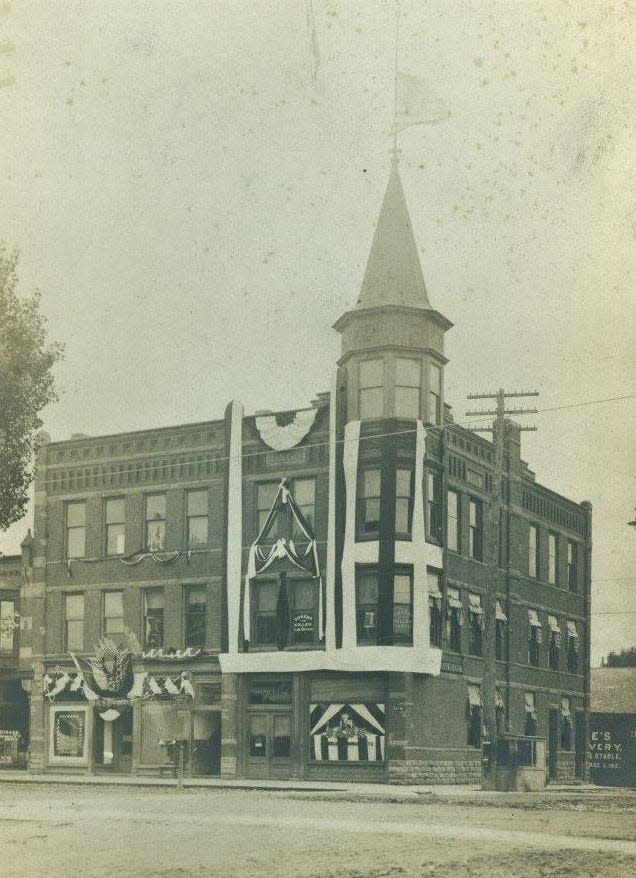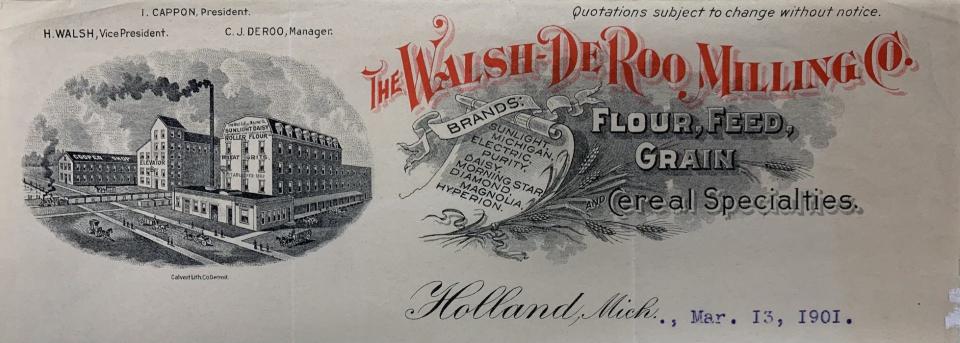Holland History: Did John C. Post fly too close to the sun?

Sometimes, like Icarus, we fly too close to the sun.
John Post was born in Holland, Michigan, in 1854, the son of Henry and Anna Post, pioneer Holland merchants. John married Kate Garrod, and the couple had five children. Holland’s premier builder, James Huntley, built them the beautiful Queen Anne-style house at 70 W. 13th St.
In 1883, it was one of the first homes in Holland to have a telephone.
As a realtor, Post benefitted from Holland’s Gilded Age, an immigration-fueled real estate boom. In March 1887, he published this advertisement in the Holland City News:
‘What makes town lots go flying so?’ the eager buyers cry.
‘Oh, Holland’s on a boom, you know,’ the agents do reply.
And so the owners mark them up, yet buyers do not squeal,
But run impatiently about, for fear they’ll lose the deal.
(Swierenga, 2014, p. 1233)
Post also had other interests: In 1887, he, Henry Post, and others repurchased the Waverly Stone Company from John Roost. Meanwhile, Post served on the board of education alongside Isaac Cappon, Teunis Keppel, Cornelius De Roo, and Dr. Oscar Yates.
In 1889, he partnered with Isaac Marsilje, Gerrit Diekema and others to co-found First State Bank.
In 1890, Post served as Leendert Mulder’s editor of the Holland City News. Mulder’s intent was to make the organization a Republic newspaper (in contrast to his smaller De Hollander, a Democratic sheet.)
In 1892, Post was a founding partner in the Holland and Chicago Transportation Company, along with William Beach, W.B. Griffin of Saugatuck, Cornelius De Roo, Isaac Cappon, George Hummer and Dr. Henry Kremers. Also in 1892, representing the Wolverine Light and Power Company, Post wrote a petition to stop Holland from forming its own electricity-generating plant (present-day Holland Board of Public Works).
In 1895, Post co-founded a trust called the Holland Improvement Company for industrial and residential land development. The other investors were William Beach, Isaac Cappon, Gerrit Diekema, George Hummer, Dr. Henry Kremers, Patrick McBride, and Arend Visscher. They purchased and sold property between 22nd and 24th Streets, the railroad tracks and College Avenue (present-day Prospect Park area).
In 1897, Post was a founding member of the Century Club, a group of Holland’s top 100 social elite, originally open to only those of Anglo-Saxon and Dutch heritage. Post was also a member of the Macatawa Boat Club, Holland’s first yacht club.
In the late 1890s, when the Holland Common Council was reviewing plans from the Holland and Lake Michigan Electric Railway Company (Interurban), Post objected to having the Interurban come to Macatawa Park because he felt those who stayed there wouldn't appreciate it. But he may have objected for other reasons.
First of all, he and Judge John Everett of Chicago had previously platted a development on the east shore of Pine Creek Bay named Evanston Park, but sales were slow. Second, he owned a steamship line. Third, he may have been contemplating an even larger investment: in 1901 he and Everett purchased from Hope College a 600-acre tract at Point Superior. There they built a hotel, which they named Waukazoo Inn, and cottages.
Subscribe: Get unlimited access to our local coverage
In 1899, with Isaac Cappon of First State Bank and competitors Arend Visscher and George Hummer of People’s State Bank, and Albert LaHuis and Christian Den Herder of the Zeeland State Bank, he was part of the Holland’s plutocracy behind the Holland Sugar Company.

In 1901, while serving as president of the Holland Sugar Company, Post sold $10,000 worth of new homes with terms of $100 down and $8 per month. In 1902, Post declared that he and Judge John Everett and Henry Everett were going to build a 40-bed hospital in Holland on 22nd Street, but he didn’t follow through.
It may be because, in 1903, he was representing the Walsh-DeRoo Milling Company in their public stock offering, in which the owners hoped to increase the business’ capital stock from $100,000 to $250,000. Meanwhile, in New York the stock market was crashing, losing 7.9% in July and another 8.2% in October, and losing 46% of its value between June 1901 and November 1903.
Exhausted, Post took his son on a vacation out west. Then, upon returning home, Post killed himself. In the aftermath, Cornelius de Roo left town, Walsh-DeRoo shut its doors, and stockholders sued in hopes of reclaiming losses.
Information for this story comes from Robert Swierenga’s "Holland, Michigan."
— Steve VanderVeen lives in Holland. You can find his contact information and read more about Holland's entrepreneurial business history at start-upacademeinc.com.
This article originally appeared on The Holland Sentinel: Holland History: Did John C. Post fly too close to the sun?

